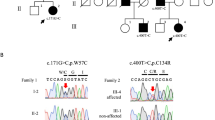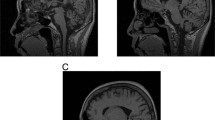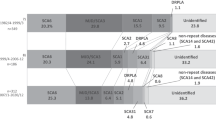Abstract
Spinocerebellar ataxia (SCA) is a genetically heterogeneous disease characterized by cerebellar ataxia. Many causative genes have been identified to date, the most common etiology being the abnormal expansion of repeat sequences, and the mutation of ion channel genes also play an important role in the development of SCA. Some of them encode calcium and potassium channels. However, due to limited reports about potassium genes in SCA, we screened 192 Japanese individuals with dominantly inherited SCA who had no abnormal repeat expansions of causative genes for potassium channel mutations (KCNC3 for SCA13 and KCND3 for SCA19/SCA22) by target sequencing. As a result, two variants were identified from two patients: c.1973G>A, p.R658Q and c.1018G>A, p.V340M for KCNC3, and no pathogenic variant was identified for KCND3. The newly identified p.V340M exists in the extracellular domain, and p.R658Q exists in the intracellular domain on the C-terminal side, although most of the reported KCNC3 mutations are present at the transmembrane site. Adult-onset and slowly progressive cerebellar ataxia are the main clinical features of SCA13 and SCA19 caused by potassium channel mutations, which was similar in our cases. SCA13 caused by KCNC3 mutations may present with deep sensory loss and cognitive impairment in addition to cerebellar ataxia. In this study, mild deep sensory loss was observed in one case. SCA caused by potassium channel gene mutations is extremely rare, and more cases should be accumulated in the future to elucidate its pathogenesis due to channel dysfunction.
This is a preview of subscription content, access via your institution
Access options
Subscribe to this journal
Receive 12 print issues and online access
$259.00 per year
only $21.58 per issue
Buy this article
- Purchase on Springer Link
- Instant access to full article PDF
Prices may be subject to local taxes which are calculated during checkout


Similar content being viewed by others
References
Klockgether T, Mariotti C, Paulson HL. Spinocerebellar ataxia. Nat Rev Dis Prim. 2019;5:24.
Zhuchenko O, Bailey J, Bonnen P, Ashizawa T, Stockton DW, Amos C, et al. Autosomal dominant cerebellar ataxia (SCA6) associated with small polyglutamine expansions in the alpha 1A-voltage-dependent calcium channel. Nat Genet. 1997;15:62–9.
Coutelier M, Blesneac I, Monteil A, Monin ML, Ando K, Mundwiller E, et al. A recurrent mutation in CACNA1G alters Cav3.1 T-type calcium-channel conduction and causes autosomal-dominant cerebellar ataxia. Am J Hum Genet. 2015;97:726–37.
Morino H, Matsuda Y, Muguruma K, Miyamoto R, Ohsawa R, Ohtake T, et al. A mutation in the low voltage-gated calcium channel CACNA1G alters the physiological properties of the channel, causing spinocerebellar ataxia. Mol Brain. 2015;29:89.
Kimura M, Yabe I, Hama Y, Eguchi K, Ura S, Tsuzaka K, et al. SCA42 mutation analysis in a case series of Japanese patients with spinocerebellar ataxia. J Hum Genet. 2017;62:857–9.
Chemin J, Siquier-Pernet K, Nicouleau M, Barcia G, Ahmad A, Medina-Cano D, et al. De novo mutation screening in childhood-onset cerebellar atrophy identifies gain-of-function mutations in the CACNA1G calcium channel gene. Brain. 2018;141:1998–2013.
Waters MF, Minassian NA, Stevanin G, Figueroa KP, Bannister JP, Nolte D, et al. Mutations in voltage-gated potassium channel KCNC3 cause degenerative and developmental central nervous system phenotypes. Nat Genet. 2006;38:447–51.
Duarri A, Jezierska J, Fokkens M, Meijer M, Schelhaas HJ, den Dunnen WF, et al. Mutations in potassium channel kcnd3 cause spinocerebellar ataxia type 19. Ann Neurol. 2012;72:870–80.
Lee YC, Durr A, Majczenko K, Huang YH, Liu YC, Lien CC, et al. Mutations in KCND3 cause spinocerebellar ataxia type 22. Ann Neurol. 2012;72:859–69.
Subramony SH, Advincula J, Perlman S, Rosales RL, Lee LV, Ashizawa T. Comprehensive phenotype of the p.Arg420his allelic form of spinocerebellar ataxia type 13. Cerebellum. 2013;12:932–6.
Pyle A, Smertenko T, Bargiela D, Griffin H, Duff J, Appleton M, et al. Exome sequencing in undiagnosed inherited and sporadic ataxias. Brain. 2015;138:276–83.
Parolin Schnekenberg R, Perkins EM, Miller JW, Davies WI, D'Adamo MC, Pessia M, et al. De novo point mutations in patients diagnosed with ataxic cerebral palsy. Brain. 2015;138:1817–32.
Montaut S, Apartis E, Chanson JB, Ewenczyk C, Renaud M, Guissart C, et al. SCA13 causes dominantly inherited non-progressive myoclonus ataxia. Parkinsonism Relat Disord. 2017;38:80–4.
Huin V, Strubi-Vuillaume I, Dujardin K, Brion M, Delliaux M, Dellacherie D, et al. Expanding the phenotype of SCA19/22: Parkinsonism, cognitive impairment and epilepsy. Parkinsonism Relat Disord. 2017;45:85–9.
Khare S, Galeano K, Zhang Y, Nick JA, Nick HS, Subramony SH, et al. C-terminal proline deletions in KCNC3 cause delayed channel inactivation and an adult-onset progressive SCA13 with spasticity. Cerebellum. 2018;17:692–7.
Kurihara M, Ishiura H, Sasaki T, Otsuka J, Hayashi T, Terao Y, et al. Novel De Novo KCND3 mutation in a Japanese patient with intellectual disability, cerebellar ataxia, myoclonus, and dystonia. Cerebellum. 2018;17:237–42.
Hsiao CT, Fu SJ, Liu YT, Lu YH, Zhong CY, Tang CY, et al. Novel SCA19/22-associated KCND3 mutations disrupt human K(V) 4.3 protein biosynthesis and channel gating. Hum Mutat. 2019;40:2088–107.
Khare S, Nick JA, Zhang Y, Galeano K, Butler B, Khoshbouei H, et al. A KCNC3 mutation causes a neurodevelopmental, non-progressive SCA13 subtype associated with dominant negative effects and aberrant EGFR trafficking. PLoS ONE. 2017;12:e0173565.
Giudicessi JR, Ye D, Tester DJ, Crotti L, Mugione A, Nesterenko VV, et al. Transient outward current (Ito) gain-of-function mutations in the KCND3-encoded Kv4.3 potassium channel and Brugada syndrome. Heart Rhythm. 2011;8:1024–32.
Giudicessi JR, Ye D, Kritzberger CJ, Nesterenko VV, Tester DJ, Antzelevitch C, et al. Novel mutations in the KCND3‐encoded Kv4.3 K+ channel associated with autopsy‐negative sudden unexplained death. Hum Mutat. 2012;33:989–97.
Seidel K, Küsters B, den Dunnen WF, Bouzrou M, Hageman G, Korf HW, et al. First patho-anatomical investigation of the brain of a SCA19 patient. Neuropathol Appl Neurobiol. 2014;40:640–4.
Acknowledgements
We thank the families involved in this research, and Ms Mayumi Miyamoto and Ms Eiko Nakajima for their technical assistance. This study was partially supported by Takada Science Foundation and Uehara Memorial Foundation.
Author information
Authors and Affiliations
Corresponding author
Ethics declarations
Conflict of interest
The authors declare that they have no conflict of interest.
Additional information
Publisher’s note Springer Nature remains neutral with regard to jurisdictional claims in published maps and institutional affiliations.
Rights and permissions
About this article
Cite this article
Tada, Y., Kume, K., Matsuda, Y. et al. Genetic screening for potassium channel mutations in Japanese autosomal dominant spinocerebellar ataxia. J Hum Genet 65, 363–369 (2020). https://doi.org/10.1038/s10038-019-0717-y
Received:
Revised:
Accepted:
Published:
Issue Date:
DOI: https://doi.org/10.1038/s10038-019-0717-y
This article is cited by
-
Timing is everything: structural insights into the disease-linked Kv3 channels controlling fast action-potential firing in the brain
Nature Communications (2022)
-
Comparison of two families with and without ataxia harboring novel variants in PRKCG
Journal of Human Genetics (2022)
-
Milestones in genetics of cerebellar ataxias
neurogenetics (2021)
-
Aggressive periodontitis and NOD2 variants
Journal of Human Genetics (2020)



